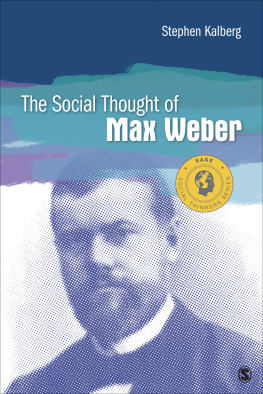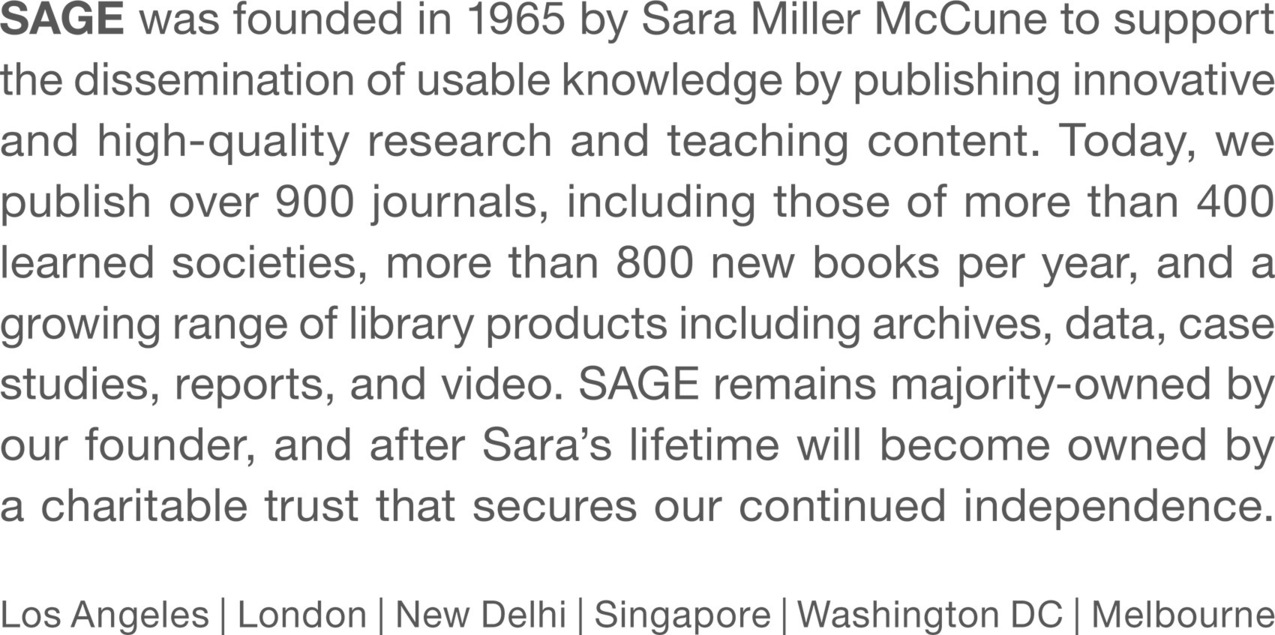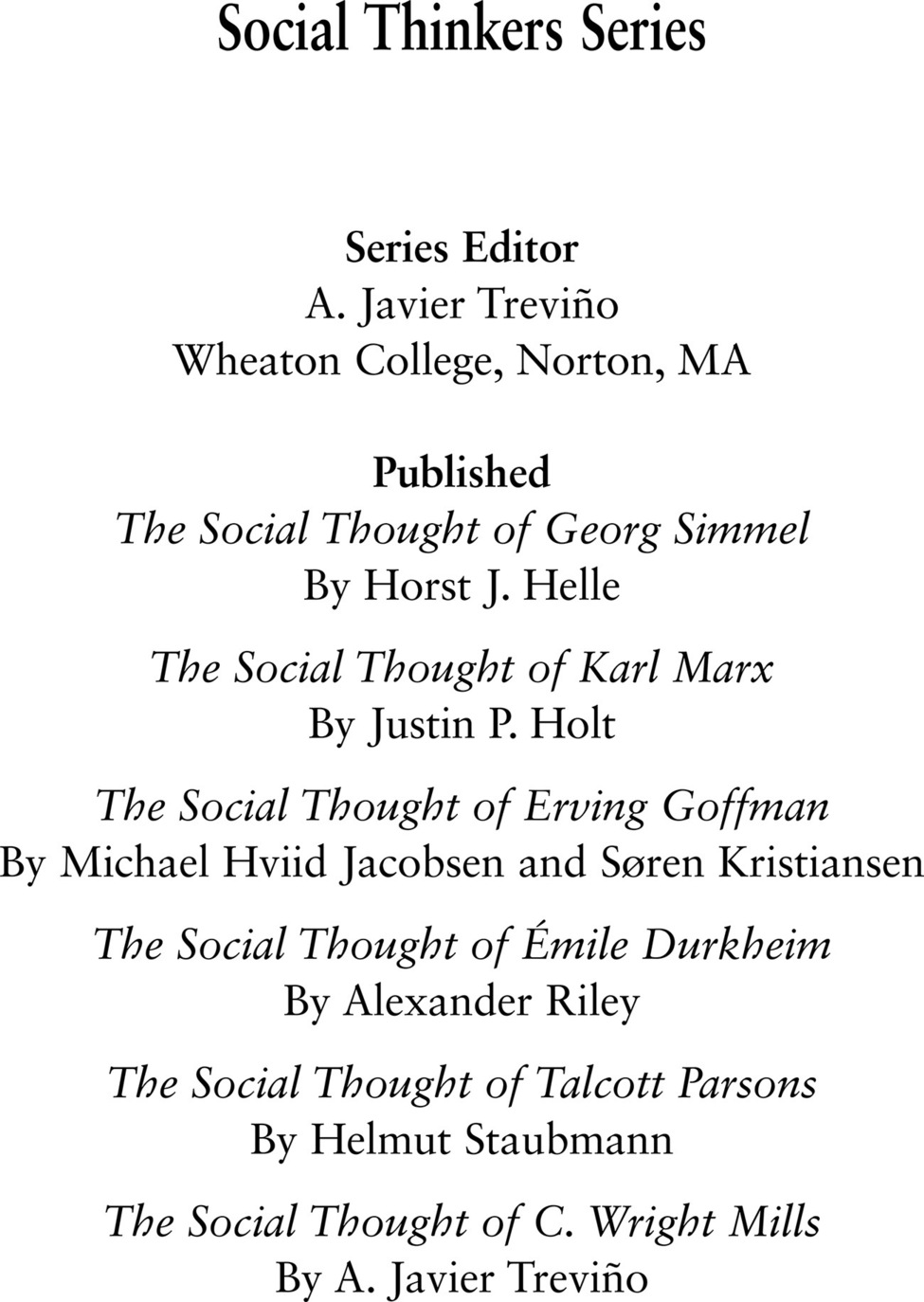The Social Thought of Max Weber
And why then did capitalist interests not call forth this stratum of jurists andthis type of law in China or India? How did it happen that scientific, artistic,and economic development, as well as state-building, were not directed in Chinaand India into those tracks of rationalization specific to the West?(Weber, 2011, p. 245; emphasis in original)
The origin of economic rationalism depends not only on an advanced development oftechnology and law but also on the capacity and disposition of persons toorganize their lives in a practical-rational manner. Wherever magical andreligious forces have inhibited the unfolding of this organized life, thedevelopment of an organized life oriented systematically toward economicactivity has confronted broad-ranging internal resistance. (Weber, 2011, p. 246;emphasis in original)
Behind the [varieties of belief was] a stand regarding something in the actualworld which was experienced as specifically senseless. Thus, the demand hasbeen implied that the world order in its totality is, could, and should somehowbe a meaningful cosmos. (Weber, 2011, p. 242)
[Weber] revealed to us things we had not seen before in such contexts. What heelucidated, what he left to us as his legacy, has today become part and parcelof our political, social, and scientific thinking to a far greater extent thanwe ourselves could possibly have realized half a century ago. (Loewenstein,1966, p. 104)
The Social Thought of Max Weber
Social Thinkers Series
- Stephen Kalberg
- Boston University
FOR INFORMATION:
SAGE Publications, Inc.
2455 Teller Road
Thousand Oaks, California 91320
E-mail: order@sagepub.com
SAGE Publications Ltd.
1 Olivers Yard
55 City Road
London, EC1Y 1SP
United Kingdom
SAGE Publications India Pvt. Ltd.
B 1/I 1 Mohan Cooperative Industrial Area
Mathura Road, New Delhi 110 044
India
SAGE Publications Asia-Pacific Pte. Ltd.
3 Church Street
#10-04 Samsung Hub
Singapore 049483
Copyright 2017 by SAGE Publications, Inc.
All rights reserved. No part of this book may be reproducedor utilized in any form or by any means, electronic or mechanical, includingphotocopying, recording, or by any information storage and retrieval system,without permission in writing from the publisher.
Printed in the United States of America
Library of Congress Cataloging-in-Publication Data
Names: Kalberg, Stephen, author.
Title: The social thought of Max Weber / Stephen Kalberg, Boston University,USA.
Description: Los Angeles : SAGE, [2017] | Includes bibliographical referencesand index.
Identifiers: LCCN 2015045994 | ISBN 9781483371498 (pbk. : alk. paper)
Subjects: LCSH: Weber, Max, 1864-1920. | Sociology GermanyHistory.
Classification: LCC HM479.W42 K3724 2017 | DDC 301.092dc23 LC recordavailable at http://lccn.loc.gov/2015045994
This book is printed on acid-free paper.
Acquisitions Editor: Jeff Lasser
Editorial Assistant: Alexandra Croell
Production Editor: Libby Larson
Copy Editor: Deanna Noga
Typesetter: C&M Digitals (P) Ltd.
Proofreader: Allison Syring
Indexer: Kathy Paparchontis
Cover Designer: Candice Harman
Marketing Manager: Jennifer Jones
Contents
Series Editors Foreword
The SAGE Social Thinkers series is dedicated to making available compact,reader-friendly paperbacks that examine the thought of major figures from withinand beyond sociology. The books in this series provide concise introductions tothe work, life, and influences of the most prominent social thinkers. Written inaccessible and provocative prose, these books are designed for advancedundergraduate and graduate students of sociology, politics, economics, andsocial philosophy, as well as for scholars and socially curious generalreaders.
The first few volumes in the series are devoted to the classical thinkersKarlMarx, Emile Durkheim, Max Weber, Georg Simmel, George Hebert Mead, TalcottParsons, and C. Wright Millswho, through their seminal writings, laid thefoundation for much of current social thought. Subsequent books will featuremore contemporary scholars as well as those not yet adequately represented inthe canon: Jane Addams, Charlotte Perkins Gilman, Harold Garfinkel, NorbertElias, Jean Baudrillard, and Pierre Bourdieu. Particular attention is paid tothose aspects of the social thinkers personal background and intellectualinfluences that most impacted his or her approach in better understandingindividuals and society.















